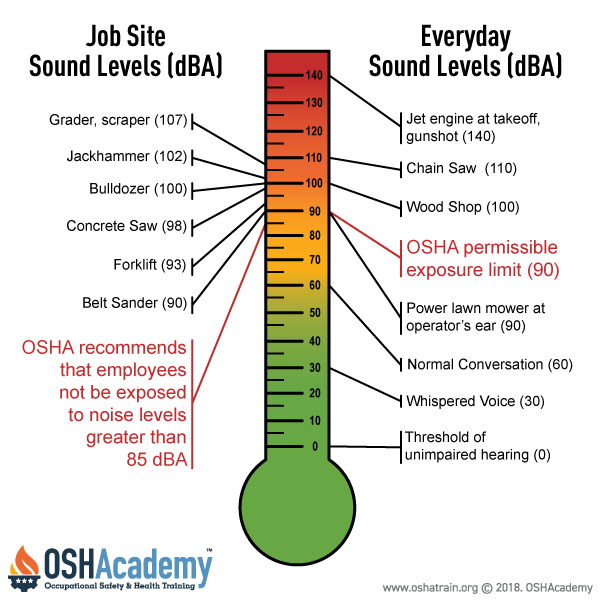Noise
Exposure to high levels of noise can cause permanent hearing loss. Neither surgery nor a hearing aid can help correct this type of hearing loss.
- Short term exposure to loud noise can also cause a temporary change in hearing (your ears may feel stuffed up) or a ringing in your ears (tinnitus).
- Repeated exposures to loud noise can lead to permanent tinnitus and/or hearing loss.
Noise-induced hearing loss limits your ability to hear high frequency sounds, understand speech, and seriously impairs your ability to communicate. Noise may be a problem in your workplace if:
- You hear ringing or humming in your ears when you leave work.
- You have to shout to be heard by a coworker an arm's length away.
- You experience temporary hearing loss when leaving work.
OSHA Requirements
OSHA sets legal limits on noise exposure in the workplace. These limits are based on a worker's time weighted average over an 8-hour day (called a 8-Hour TWA). With noise, OSHA's permissible exposure limit (PEL) is an average of 90 decibels (dBA) for all workers for an 8-hour day.
The OSHA standard uses a 5 dBA exchange rate. This means that when the noise level is increased by 5 dBA, the amount of time a person can be exposed to a certain noise level to receive the same dose is cut in half.
OSHA's requirement to protect all workers in general industry calls for employers to implement a Hearing Conservation Program where workers are exposed to a time weighted average noise level (called the "action level") of 8-Hour TWA of 85 dBA or higher.
Hearing Conservation Programs require employers to measure noise levels, provide free annual hearing exams, free hearing protection, and training.
Knowledge Check Choose the best answer for the question.
2-6. A hearing conservation program is required if exposure to the "action level" of _____ is experienced by employees.
You forgot to answer the question!


